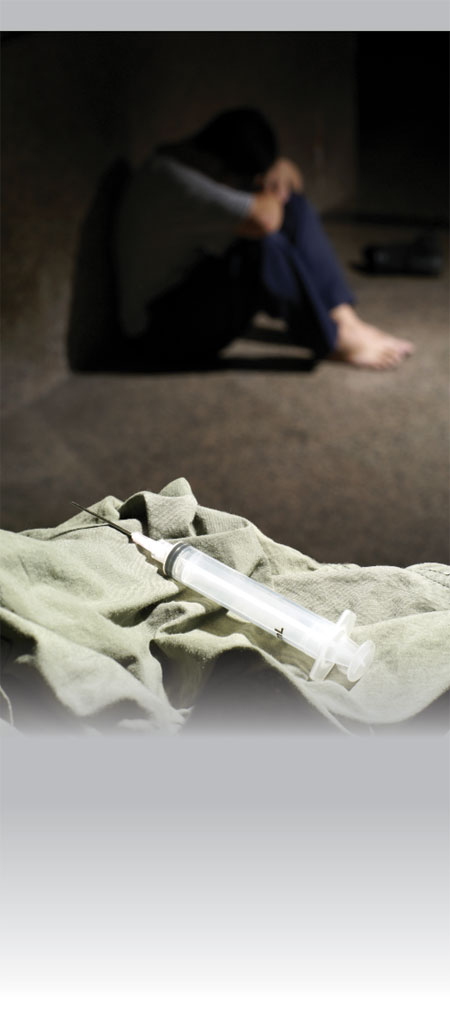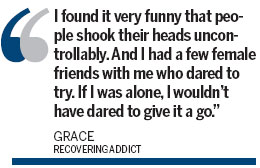Rescue at what cost?
Updated: 2013-11-15 06:52
By Ming Yeung(HK Edition)
|
|||||||
A furious public debate is raging, as public consultation continues over a proposal that would authorize police to carry out drug tests on anyone, on the merits of what are deemed "reasonable grounds" by police. Ming Yeung reports.
The public consultation on a program called "Rescue", designed to fight drug abuse, has been ongoing since September, under the aegis of the Action Committee Against Narcotics.
"Reasonable suspicion" empowering police to require drug testing would include a suspect's behavior and the presence of drugs in the surrounding area. Under the present law, police can test only when a suspect is found to be carrying drugs.
The proposal for the adoption of stricter laws is driven by statistics. From 2011-2012, police recorded 140 cases where drugs were found in known vice establishments, but they were barred from making arrests.
That argument was hotly disputed by the Hong Kong Medical Association (HKMA), which argued that the consultation paper presented no evidence that "Rescue" would provide effective early identification of substance abusers or that it would advance treatment effort.
The medical community railed at the inconvenience virtually random testing would cause ordinary people, innocent of wrong doing, subjecting them to intrusive infringements on their privacy, amounting to a violation of the most basic human rights.
The HKMA held that existing measures designed to tackle drug abuse have been effective from the decreasing numbers of new cases. Overall numbers fell 23 percent to 10,939 in 2012 from its peak of 14,241 in 2008, as shown in the Central Registry of Drug Abuse.
Patrick Ho Hin-ming, service director for drug rehabilitation of the Evangelical Lutheran Church Social Service-Hong Kong, has taken a more neutral stance. He says he agrees with the "Rescue" program in principle because it would make it easier for police to identify drug abusers, but "certain details" have to be worked out to avoid increasing tensions between police and the public.
"We suggest an independent appeal system that is open and transparent. The number of operations and results (how many people are tested and how many of them are real addicts) should be made public to determine its success rate. If there's a huge discrepancy, it indicates if there is any abuse of power."
Ho did agree that it would be wrong to allow frontline police officers to "stop and search" on the street. Not only would that be a difficult exercise to supervise but it could lead to abuse of authority. "We expect that only the higher-ranking officers with sufficient training would be allowed to conduct the tests and the tests should be done only in establishments such as police stations and hospitals."
Greater relapse chances
Ho said although the 2.6-year history of drug abuse among people intercepted by law enforcement agency in 2012 was significantly shorter than the 5.2 years of drug abusers reported by the NGOs, the drug addicts busted by the police, as shown by their track records, have a greater chance of relapse into drug taking.
"Successful drug rehabilitation depends largely on one's own will. It's useless to intercept the short-time drug abusers who have no intention to quit at all," he commented, explaining that short-term users who experienced fewer health effects from drugs usually don't see the need to quit.
"Through the persuasion of social workers, who have built up stable relationships with them over a longer term, I'm confident the success rate of helping them to stay clean would be much higher."
Cheng Chi-man, chairman of the HKMA's beat drugs action committee, said forcing people to undergo drug tests would not solve the issue as 80 percent of drug abusers were "hidden" abusers who took drugs discretely at home.
Grace (not her real name), a 27-year-old recovering addict, is more supportive of "Rescue". She thinks the scheme could be a way out for abusers struggling ceaselessly with inner demons. She began taking drugs at 15 until she decided to quit two years ago. There were times when she thought she was in danger of dying from an overdose. During those episodes, she said, she hoped the police would come and arrest her and take her to mandatory rehabilitation.
"We wanted to be found, to be cared for, but we wouldn't dare to report ourselves," she stressed.
Grace remained "hidden" for entire 10 years, until she and her addicted husband spent all their savings on drugs, including hundreds of thousands of dollars her mother lent her to buy stocks, and could no longer support their two children.
Her mother, surnamed Chan, regrets that she had trusted her daughter wholeheartedly and in the meantime, missing the warning signs of her daughter's secret destructive habit.
"Who would have thought my girl who gave me money every month was a drug addict? I spoiled her for all those years," Chan sighed.
Grace was a cheerful girl on the mainland but things got upside down when she migrated to Hong Kong in 2000. She had a hard time getting along with her Form One classmates and hated the cramped conditions at home, so she went back to her hometown almost every weekend.
At first, all she wanted was happiness, hanging out with friends and singing karaoke. To avoid suspicion of her relatives, she would place a human-size doll under the quilt and sneaked out when everyone was asleep.
Soon after, her teenage peers offered her something new, something exciting - cough syrup. "I didn't know only a bottle of cough syrup could get me high," she said.
She was introduced to some triad members from Hong Kong. Purely out of curiosity, she began taking MDMA, a drug that produces an energizing effect and heightens enjoyment of tactile sensations. "I found it very funny that people shook their heads uncontrollably. And I had a few female friends with me who dared to try. If I was alone, I wouldn't have dared to give it a go."
Faster side effects
But the side effects came faster than she thought. Fatigue and involuntary clenching of teeth came quickly.
"Before I realized it, I was addicted," said Grace, who acquired a dependency on ketamine, which didn't let her go for the next 10 years. "I traveled between Hong Kong and the mainland to drug parties."
The situation only got worse. She met her husband - another drug addict. Between the two of them, they spent HK$1,000 a day on ketamine. Grace dropped out of school after Form Three.
She got a job as a warehouse clerk and would take the ketamine with her to work, hidden in her bra. She couldn't resist drugs, she couldn't risk being found out, either.
"Once I took too much at a time I couldn't concentrate on work at all. I even placed a mirror in front of the keyboard on the desk for fear someone would find out," she recalled.
In 2008, over her parents' opposition, Grace married her boyfriend. Three years later the couple had two kids but the drug taking never let up. Grace and her husband had graduated to cocaine - a more expensive habit. One day they spent HK$14,000 on cocaine, and went on a 24-hour drug orgy.
Mood swings were keeping her off balance and they affected her relationship with her husband. "I was emotional all the time. My husband and I suspected each other. We fought over a snort of crack."
With her husband serving as her "partner in crime", Grace couldn't shake the drug habit. Even after giving birth, she couldn't breast feed.
"One night I took my children from my mother in law to stay with us. But my husband still bought drugs so we crammed into the bathroom to take them after they fell asleep. My son woke up in the middle of the night and banged on the door and cried out loud outside. I felt terrible and remorseful. There was a mixture of painful feelings I could not explain," she said.
"I began to hate drugs. I started to realize the mistake that drove me to this miserable situation."
Grace made her choice. She reported her husband to the police. He was caught red-handed. "I felt so relieved that he had to undergo mandatory rehabilitation." She's never touched drugs since.
The consultation paper also seeks public views on how many breaks should be given abusers before they are prosecuted. Patrick Ho thinks multi-disciplinary professionals like social workers and psychologists should be brought in to decide when prosecution was merited.
"If there's a clear-cut line of how many chances being granted, we probably will miss some personal issues that affect his/her determination to come clean," Ho said.
Working as a peer counselor for the Evangelical Lutheran Church at the moment, Grace never gets tired of telling her stories to the teenagers willing to relate to her. "I know this is a time full of challenges and the students are particularly prone to temptations. By sharing my experience with them, I hope they will stay away from drugs."
Contact the writer at mingyeung@chinadailyhk.com


(HK Edition 11/15/2013 page2)